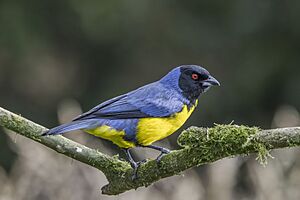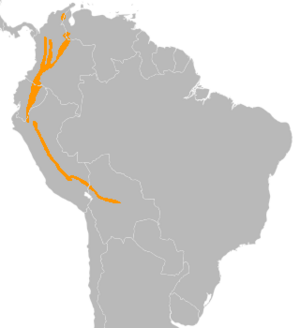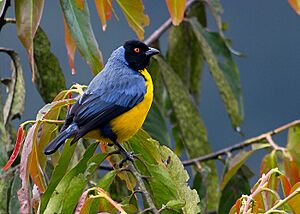Hooded mountain tanager facts for kids
Quick facts for kids Hooded mountain tanager |
|
|---|---|
 |
|
| Buthraupis montana cucullata, Colombia | |
| Conservation status | |
| Scientific classification |
|
| Kingdom: | Animalia |
| Phylum: | Chordata |
| Class: | Aves |
| Order: | Passeriformes |
| Family: | Thraupidae |
| Genus: | Buthraupis Cabanis, 1851 |
| Species: |
B. montana
|
| Binomial name | |
| Buthraupis montana (d'Orbigny & Lafresnaye, 1837)
|
|
 |
|
| Hooded mountain tanager range map | |
| Script error: The function "autoWithCaption" does not exist. | |
Script error: No such module "Check for conflicting parameters".
The hooded mountain tanager (Buthraupis montana) is a beautiful bird with bright yellow, blue, and black feathers. It belongs to the tanager family, called Thraupidae. This amazing bird is the only one of its kind in the group known as Buthraupis.
You can find the hooded mountain tanager living in the high Andean mountains. It makes its home in forests, woodlands, and bushy areas. These birds live in several South American countries, including Bolivia, Colombia, Ecuador, Peru, and Venezuela. It's quite a large tanager, measuring about 23 centimeters (9 inches) long and weighing around 85 grams (3 ounces).
Contents
Discovering the Hooded Mountain Tanager
Who Discovered This Bird?
Scientists first officially described the hooded mountain tanager in 1837. Two French naturalists, Alcide d'Orbigny and Frédéric de Lafresnaye, found a specimen in the Bolivian Yungas. They gave it the scientific name Aglaia montana at that time.
Later, in 1851, a German bird expert named Jean Cabanis created the group Buthraupis. Today, the hooded mountain tanager is the only species in this special group.
What Does Its Name Mean?
The name Buthraupis comes from ancient Greek words. "Bou-" means "huge," and "thraupis" is a word for a small bird. Bird scientists often use "thraupis" to mean a tanager.
The second part of its name, montana, comes from Latin. It simply means "of the mountains," which makes sense because this bird lives in high mountain areas!
Different Types of Hooded Mountain Tanagers
There are six different types, or subspecies, of the hooded mountain tanager. They look very similar but live in slightly different areas:
- Buthraupis montana venezuelana – Found in northwest Venezuela.
- Buthraupis montana gigas – Lives in northern Colombia.
- Buthraupis montana cucullata – Found from western and central Colombia to Ecuador.
- Buthraupis montana cyanonota – Lives in northern and central Peru.
- Buthraupis montana saturata – Found in southeast Peru.
- Buthraupis montana montana – Lives in western Bolivia.
 | Percy Lavon Julian |
 | Katherine Johnson |
 | George Washington Carver |
 | Annie Easley |



